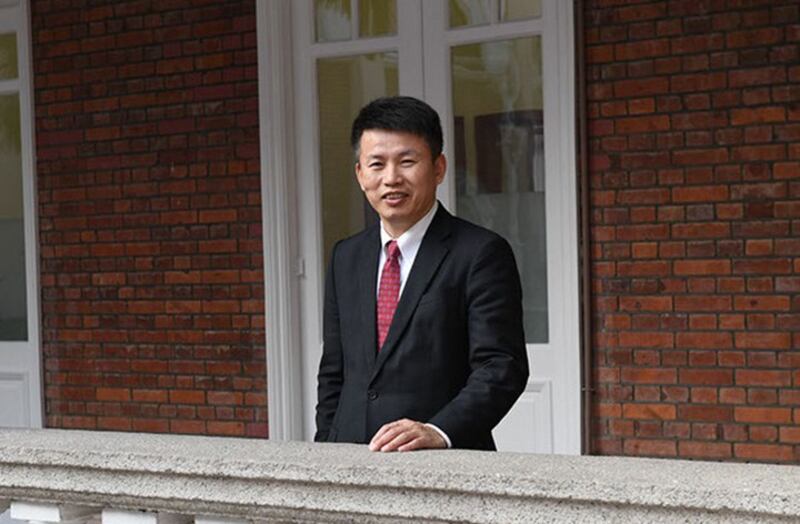Authorities in Hong Kong are probing allegations that mainland Chinese students are using fake academic credentials to enroll in a prestigious MBA program, sparking fears of falling standards in the city, whose officials are keen to attract migrants from mainland China in the wake of a mass wave of emigration.
As many as 30 applicants to the University of Hong Kong Business School have been found to have used fake documents supplied by a higher education agency, some of them for American universities, Business School Dean Cai Hongbin told the financial news site Caixin in a recent interview.
The revelations come amid growing concern that official willingness to encourage inward migration from mainland China to boost the city's economy could be having a negative impact on the reputation of its colleges and universities, which has already been hit by a compulsory patriotic education program.
"As fraudulent academic qualifications seriously affect student admission by local higher education institutions and Hong Kong's hard-earned international reputation, the [government] and all sectors of the Hong Kong community deeply resent such acts and have zero tolerance towards the matter," Hong Kong's Secretary for Education Christine Choi told the city's legislature in a recent statement.
While police arrested a man and a woman on June 26 and July 3 on suspicion of using fake documents, the university is now asking students to resubmit their academic qualifications, as HKU Business School Dean Cai warned that the fake degrees were mostly found in applications that used a "guaranteed admission" service from an academic agency.
RELATED STORIES
[ Hong Kong officials want louder singing of national anthem in schoolsOpens in new window ]
[ Hong Kong sees fall in academic freedom amid ongoing crackdownOpens in new window ]
[ Hong Kong schools ban books, warn teachers not to get 'political'Opens in new window ]
[ China probes 'Gaokao' college entrance exam cheating claimsOpens in new window ]
At least 30 students are believed to have used fake documents as part of the "guaranteed admission" service that costs applicants 500,000 yuan apiece, Cai told Caixin.
"Their ability to make fake academic qualifications is astonishing," the July 4 article quoted Cai as saying. "The University of Hong Kong has carried out spot checks as part of this review of academic qualifications."
Cai said many of the fake documents weren't distinguishable from the genuine article, right down to letterhead, envelope, paper quality and other details.
An online search for the keyword "guaranteed admission" in Chinese found several companies offering such services, including a website called Gabroad, which offers "Guaranteed admissions to Top 20 schools" including Harvard, claiming a 100% success rate.
The same site also offers such services for universities in Hong Kong, including the University of Hong Kong and the Chinese University of Hong Kong.
Full refunds are offered to anyone who isn't offered a place, regardless of grades and test scores.
Falsifying or supplying fraudulent academic qualifications carries a maximum jail term of 14 years in Hong Kong.
Any violations will result in "decisive disciplinary action" against the students concerned, including expulsion, while offenders will also likely be prosecuted, Choi said in a June 26 written reply to the Legislative Council.
Education and immigration
The HKU Business School is a highly competitive school, receiving more than 24,000 for taught postgraduate programs in 2023, and only awarding places to 2,600 of them, according to Caixin.
All masters students at the school are now being required to resubmit undergraduate degree certificates, transcripts and other materials, the article said.
Year-long taught masters are particularly sought after by mainland students, because they are a quick way to secure the right to remain in the city for at least a year and look for work, offering a pathway to permanent residency.
Hong Kong's Chuhai College of Higher Education, which once struggled to recruit enough bachelor's degree students to balance the books, had more than 1,500 students in September 2023 after launching a range of taught, one-year masters courses and promoting them aggressively on mainland social media platforms like Xiaohongshu, according to an investigation by RFA Cantonese.
"Chuhai College in Hong Kong is known as a master's mill, because a lot of middle-class people from mainland China come here to take a one-year master's ... during which they can get a Hong Kong ID card for their kids," according to one video circulating on Xiaohongshu in recent weeks.
"A lot of influencers and agents promote the college as a one-stop shop for education and immigration," the video says.
While Chuhai College once had close ties with the government of Taiwan, it has recently repackaged itself as a "red" school, setting up a research institute to study ruling Chinese Communist Party leader Xi Jinping's influence and infrastructure program known as the Belt and Road.

Taiwanese national security researcher Shih Chien-yu said he once worked as a lecturer at Chuhai College for many years, and confirmed that it has a reputation for not being too picky about who gets admitted.
"Chuhai College doesn't check very carefully whether applicants meet admission criteria," Shih told RFA Cantonese in a recent interview. "There is strict training and guidelines regarding assessment of student performance, but I don't think it gets implemented in accordance with those standards."
Chuhai College is now on track to upgrade to university status, if it can attract similar numbers of students next academic year.
The College hadn't responded to inquiries about its strategy or admissions policies by the time of writing.
However, a statement on its website says the school "has always followed the principles of fair selection, transparent procedures and merit-based admissions when recruiting for both undergraduate and master's courses."
Translated by Luisetta Mudie.
